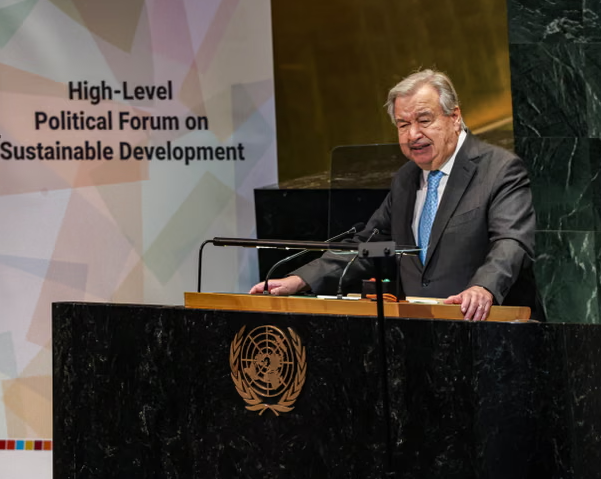
Speaking in New York, Guterres highlighted a marked shift in the energy landscape, pointing to new data showing that more than 90% of renewable electricity projects are now cheaper than their fossil fuel counterparts. Solar energy alone is around 41% less costly than the lowest-cost fossil options, while onshore wind is now priced at less than half, according to a report released by the International Renewable Energy Agency (IRENA).
"We are on the cusp of a new era," Guterres said. "Fossil fuels are running out of road. The sun is rising on a clean energy age."
Clean Energy Becomes the Smart Economic Choice
Driven by large-scale deployment, advancements in technology, and significant manufacturing investment — particularly in China — the costs of renewable technologies have plunged. In 2024, investment in renewables hit a record $2 trillion, outpacing fossil fuel investment by $800 billion and marking a 70% increase over the last ten years.
Guterres emphasized that choosing renewables is now the rational path for governments seeking energy security, stable consumer costs, and resilience amid growing geopolitical instability. "Fossil fuels are the greatest threat to energy security today," he warned. "They expose countries to price shocks, supply volatility, and political unrest. In contrast, no one can embargo the sun or place tariffs on wind."
Yet rising global demand for electricity — particularly for cooling amid record heatwaves and powering energy-intensive data centres — threatens to offset climate progress if met with fossil fuels. Guterres issued a challenge to major tech companies, urging them to commit to powering 100% of their operations with clean energy by 2030.
Global Plans Must Prioritise Decarbonisation
Under the Paris Agreement, countries must submit updated national climate plans this year. Guterres called on world leaders to use this moment to double down on decarbonisation and reallocate subsidies away from fossil fuels.
"This transition is about energy security. It's about safeguarding livelihoods. And it's smart economics," he said, reiterating that the world has already "passed the point of no return" for fossil dependence.
Francesco La Camera, IRENA's director general, echoed Guterres's optimism, stating: "The cost-competitiveness of renewables is no longer a projection—it's today's reality. Clean power is now the best bet for affordability, security, and sustainability."
Challenges Remain: Infrastructure, Minerals, and Political Headwinds
Despite these gains, several obstacles threaten to slow progress. The IRENA report notes that while renewable generation is surging, grid investment is falling short. Currently, for every $1 spent on generation, only $0.60 is invested in grid infrastructure — a gap that must be closed to fully enable the clean energy transition.
The supply of critical minerals used in wind turbines, batteries, and solar panels is also a growing concern. Meanwhile, geopolitical tensions, trade disputes, and protectionist policies are straining global supply chains.
Political inertia and fossil fuel lobbying persist, particularly in major economies. In the U.S., Donald Trump has rolled back incentives for clean energy and pledged support for coal and oil. China, despite being a renewables leader, continues to approve new coal-fired power plants. In March, India celebrated producing one billion tonnes of coal.
La Camera cautioned: "Progress is not guaranteed. Maintaining momentum requires global cooperation, stable policy frameworks, and a commitment to long-term thinking."
A Shift in Tone — and a Call for Bold Leadership
Guterres's speech marked a tonal shift from recent years, when he often sounded the alarm on climate in increasingly dire terms. In 2022, he warned of climate negotiations ending in doom. By 2023, he had coined the phrase "the era of global boiling" and labelled fossil fuel interests "the godfathers of climate chaos."
Now, his message is notably more hopeful — grounded in economic trends and technological progress. It is, however, no less urgent.
Climate experts say governments should seize this moment to commit to stronger targets ahead of the COP30 summit in Brazil this November.
"Any investment in new fossil infrastructure is a reckless gamble," said Bill Hare, CEO of Climate Analytics. "Meanwhile, the renewable race promises not just lower bills and more jobs, but true energy independence — especially for developing nations like those in Africa, where clean energy potential is enormous but underfunded."
Kaysie Brown of the E3G thinktank added: "We now have both the technical capability and the financial rationale to drive the energy transition. What's needed is the political courage and global cooperation to make it real."